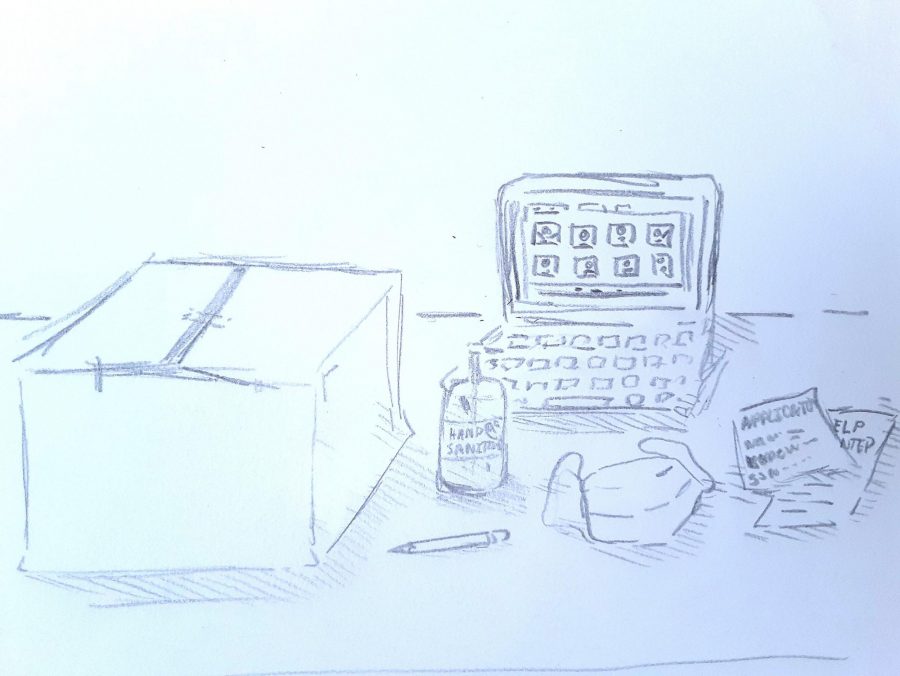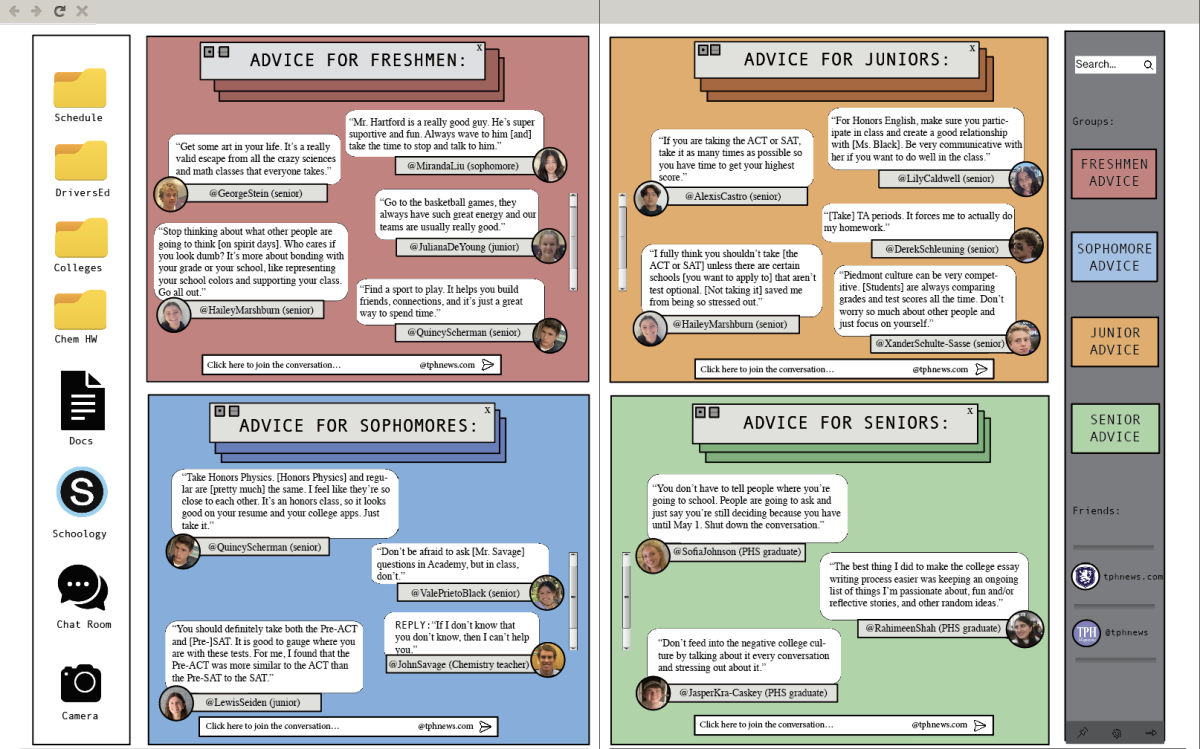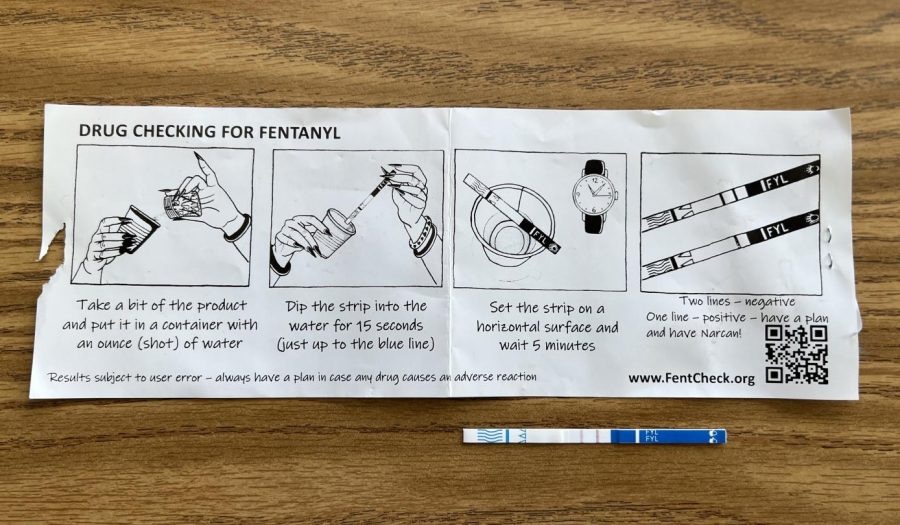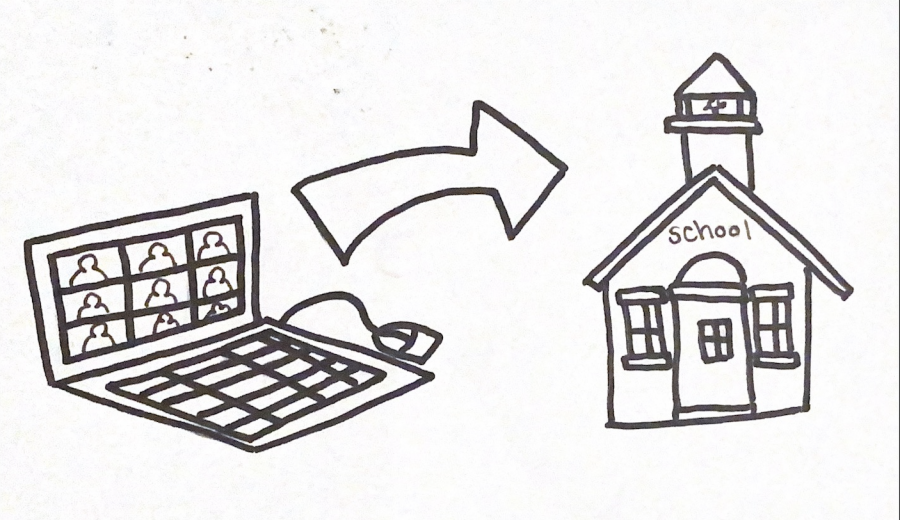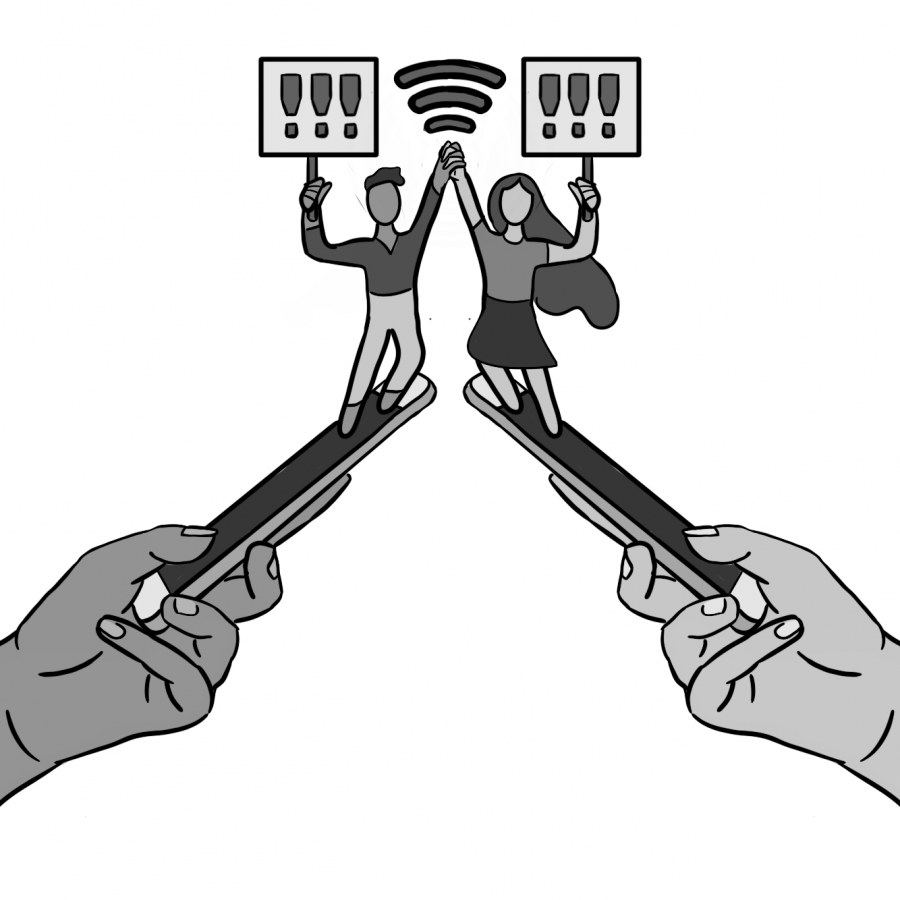Graphic design by Katherine Irving and Samantha Fanger
Randomly generated names (Cody, Leah, June, Eric, Irene, Crystal, and Ruby) were used in place of students’ actual names in order to maintain anonymity.
Too JUUL for school
The mint and mango flavors are the fan favorites, and apparently the creme brulee one is terrible. Gum? No. Ice Cream? Try again. JUUL pods? Right on.
JUUL released their e-cigarette product in 2015 to eliminate combustible cigarettes, and according to the Center for Disease Control and Prevention (CDC), one third of the surveyed high school and middle school students had used e-cigarettes.
Seniors Cody and Leah originally got a JUUL because they used to smoke cigarettes as a social activity, but wanted a healthier option. They share a JUUL to make it less expensive and because neither of them feel the need to constantly hit the JUUL.
“For me it’s really about the head rush,” Cody said. “You hit a threshold where you can keep hitting it, but you are not going to get a head rush. You may feel more lucid or more focused.”
 Junior June got her JUUL after taking a hit from a friend’s and now shares it with a another friend of hers.
Junior June got her JUUL after taking a hit from a friend’s and now shares it with a another friend of hers.
“We go through them way too quickly,” June said. “Most people use four pods per week, which is on the higher end, if they are constantly hitting it. We go through eight a week.”
Cody and Leah said that they use one and a half pods each week, and June said she has noticed students using their JUULs at school.
“Some people do it in class and put it in their sleeve to be sly about it,” June said.
June also said that more often, students go to the bathrooms to use their JUULs because it is riskier to take a hit in class.
“If you hit it at school, you get a head rush, but you are not high,” Cody said. “There are no obvious side effects, so it is a casual thing to do, and nicotine actually keeps you awake. You are completely competent.”
Despite the lack of noticeable effects, Cody said that he uses his JUUL more often outside of school.
“The few times I’ve done it at school, I was looking around to make sure no one was there,” Cody said. “It’s much more comfortable at home when you don’t have to worry about that.”
In addition to students using JUULs at school, June said that most of what her friends do outside of school involves hitting the JUUL.
“The JUUL is kind of the center of attention,” June said.
Leah said that in comparing marijuana to a JUUL, she would prefer to get high, but would rather bring a JUUL to a party than go to a party high.
“When people are drunk, everyone wants to hit the JUUL,” Cody said.
 While the party scene now involves JUULs, Leah said that at Piedmont students either approve of the trend of JUULs and agree to take a hit or strongly oppose the idea, warning others that JUULs cause cancer.
While the party scene now involves JUULs, Leah said that at Piedmont students either approve of the trend of JUULs and agree to take a hit or strongly oppose the idea, warning others that JUULs cause cancer.
“There is a stigma around JUULs because people think nicotine and tobacco and then think cigarettes and lung cancer,” Cody said. “I think that is just misinformed. I think people are not as informed about it as they could be.”
However, junior Maxine Miller, who does not agree with the use of JUULs, said that people who own JUULs are not educated about the health risks and their potential to cause cancer.
Despite differing opinions of health risks, June, Cody, and Leah all said that they would draw the line on their usage at some point.
“Recently we are trying to use it less so we don’t have to spend as much money,” June said.
June said the JUUL cost her 70 dollars but it came with 4 pods, so the JUUL itself is probably 40 to 50 dollars.
“With the recent nicotine tax it would be almost 30 dollars for a pack of four [pods],” June said.
Leah, however, said that switching to JUULs has saved her money.
“I used to smoke a lot of weed, so I used to spend a lot more money on weed than I am now,” Leah said.
While June would draw the line when the cost for JUUL pods becomes too high, Leah said she would not use her JUUL if she stops getting the head rush, therefore getting no benefit from taking a hit.
“We are hitting it for the head rush and there is a certain point where you stop getting a head rush, you are not addicted, but you keep doing it anyways,” Leah said. “That is the habitual thing that I just can’t get behind. If I’m not getting anything out of it, I would not want to continue doing it.”
Miller agreed and said that she knows people who do not get a head rush anymore.
“People do it just as a form of social acceptance, not even because they like how it feels,” Miller said. “They just do it to do it, which I don’t understand.”
Cody and Leah said they do not want to reach a point where they are dependent on nicotine.
“I would draw the line if [Leah] had it and I was like ‘that is the only thing that would make me feel good now,’” Cory said. “If I reached that point, I would be scared because it is not good to be dependent on any substance, even if it is coffee.”
Miller said she has experienced people fidgeting because they feel the need to take a hit.
“If you can’t go a day without doing it, I don’t see how you can say it is healthy,” Miller said.
Cody also said that the idea of being depressed because he is not hitting the JUUL scares him, but he feels confident he would stop before reaching this point.
Miller said that her opposition to JUULs originates from her fear of addiction.
Cody said that he still has self control and does not have a problem setting the JUUL down and not touching it. He also said that if he ever recognized a problem, he would think about how to overcome it.
Similarly, Leah said that she would be able to recognize if she felt more dependent on the JUUL.
“I have no doubt that I would be able to stop,” Leah said.
The Buzz on Vaping
A student asks to go to the bathroom. Already they’ve gone twice and the teacher denies a third trip. This leaves only one option: do it in class. The sleek, black rectangle slides out of the student’s pocket and into his hand. It looks like an elongated USB. Subtly, he raises it to his mouth and takes two quick puffs while the teacher’s back is turned. He blows the smoke into the sleeve to dissipate. The effects set in and the craving recedes once more.

Nicotine has taken a new form in JUUL, a vaping device which primarily uses nicotine. It is a new way to smoke the substance without the blatant lighting up of a cigarette. One of the main selling points of the JUUL, besides the head rush, is that the health risks are lower than regular cigarettes, according to a study conducted by JUUL laboratories.
According to the CDC, nearly 90 percent of people who smoke cigarettes report starting before the age of 18. However, the CDC also reported a 7.8 percent decrease in the reported smoking of cigarettes in high school students from 2011-2016. Even so, cigarettes are still a major issue in the U.S, causing almost 90 percent of all lung cancer deaths and about 80 percent of chronic obstructive pulmonary disease, according to the CDC. They contain 43 carcinogens, or cancer-causing substances, which are above the safe level. Cigarettes also contain over 400 other toxins, not to mention the inhalation of smoke in general is harmful to the lungs.
Sophomore Eric said that he knows JUUL contains nicotine but feels like JUUL is not nearly as bad as cigarettes.
However, according to a study conducted by the JUUL laboratory, a usual JUUL pod contains three carcinogens in amounts above what are considered safe, but only barely. Considering the amounts of these same carcinogens in cigarettes are far higher, this study supports the theory that JUUL is safer than cigarettes. However, other studies suggest otherwise. New York University professor Dr. Moon-Shong Tang conducted a study in which he compared the effects of a JUUL on mice and the effects of cigarettes on mice.
“We found nicotine itself is capable of damaging DNA and inhibiting the ‘repair system’ from repairing the DNA,” Tang said. “This means that e-cigs and JUUL can cause the same damage as regular cigarettes, and that nicotine itself is a carcinogen.”
Harmfulness to the body is not the only factor when considering JUUL versus cigarettes. Cost and addictiveness are also players that can drastically change the game.
 In 1964, cigarette usage was at an all time high, according to the CDC. The average number of cigarettes smoked by one person every year was over 4,500. A regular pack of cigarettes contains 20 cigarettes and costs $6.16, so to smoke that amount would cost $1,386 dollars annually. However, scientists raised questions about the dangers of smoking and soon after, nicotine usage per capita plummeted. In 2012, the average was below 1,500, which would cost $462.
In 1964, cigarette usage was at an all time high, according to the CDC. The average number of cigarettes smoked by one person every year was over 4,500. A regular pack of cigarettes contains 20 cigarettes and costs $6.16, so to smoke that amount would cost $1,386 dollars annually. However, scientists raised questions about the dangers of smoking and soon after, nicotine usage per capita plummeted. In 2012, the average was below 1,500, which would cost $462.
Comparatively, the cost of four JUUL pods from the official JUUL website is $15.99. Sophomore Irene said that she uses an entire JUUL pod in one to two days. Assuming one uses one cartridge every two days, this lifestyle would cost $730 every year, excluding the price of the JUUL device. If one used a cartridge everyday, it would cost $1460 annually.
Although expensive, a far more significant aspect is the addictiveness of JUUL. Irene said she does not think JUUL is nearly as addictive as cigarettes are.
“It seems like everyone is overrating the addiction factor,” Irene said. “I’m definitely not addicted and I doubt that [JUUL] is anywhere near as addictive as cigarettes are.”
However, Tang said he thinks that JUUL could be equally addictive to cigarettes.
“JUUL is nicotine.” Tang said. “Nicotine is what makes you addicted. When you use a JUUL, it has the same effect as smoking a cigarette.”
Eric said he experiences this addiction often and that it can be hard for him to go without his JUUL for long periods of time.
“Usually I get over it, but sometimes I can’t,” Eric said.
Tang said the difference in the effects on your health is how often you smoke.
“[JUUL and cigarettes] have very similar effects on the body,” Tang said. “This means that the factor dictating the effect on your health is how much you smoke or vape, which depends on how addicted you are.”
The attitude towards nicotine has shifted from positive to negative in recent years. Tang’s study, which showed that nicotine is a carcinogen itself, may deter people from JUUL in the future. However, JUUL may still become a proxy for a new wave of nicotine, and with it usher in a new wave of addicts.
What the students say:
Effect on the drug culture at PHS
“[Juuling] has really impacted [the drug culture at Piedmont]. It’s just a common thing that people have JUULed before or smoke commonly. People do it before school, at lunch, people go off campus at lunch, go to the cem and they’ll smoke and they’ll JUUL. I don’t really know if it has affected the school academically, but socially it definitely has, because it’s pretty hard to ignore that half of the time you go to the bathroom someone is in there, and they’re just sitting there and you’re like ‘ok you’re not actually going to the bathroom.’” -Crystal
“I’ve seen people leave class and be like ‘oh I have to go juul’ which is a little scary to see. But I think people getting high in between periods is because they don’t like their class and just want to show up high because it makes it more fun” -Crystal
“With JUULing, you see these videos online of like tricks that people are doing and I think that makes it more of like a social thing.” -Crystal
“I think JUUL is creating a new group of users because it’s harder to identify JUULers, so more people are doing it with less consequences, and I think that since it’s so easy to get ahold of and doesn’t have many repercussions because it’s not easy to detect whether someone’s been JUULing, that more people are doing it. It’s becoming a part of Piedmont culture.” -Ruby
The attraction
“I think that JUULing is a lot easier to cover up because it doesn’t smell very much and I think it’s a lot more addictive. I’ve seen a lot of more people get into that than smoking weed pens.” -Crystal
“[JUULs and vape pens] are safer and easier to use than the traditional ways of consuming their products, they have flavors that are appealing and interesting and may potentially taste better than the other ways of consuming the products, they can help people quit using those products, they are not going to lead to use of those other products, they are more discreet, they are not addictive, oh I could go on and on.” -Licensed psychologist Dr. Danielle Ramo
“I think the JUUL’s popularity has really increased because it’s something that you can come down from really easily. If you’re high, you can get tested. You’re parents can drug test you or if you’re applying for college or a job you can get drug tested and it will obviously show up, but JUULing doesn’t really show up on anything. So I’ve seen a lot of people JUULing now and I think that you can just buy it at like a gas station or something, and they’re not that expensive” -Ruby
Misconceptions
“I think people do not know the potential negative consequences, people don’t know whether they’re consume nicotine, they do not realize that the nicotine is as addictive in a JUUL or an e-cigarette as it is in a tobacco cigarette, it’s the same exact substance, and the biggest risk that I think teens aren’t aware of is that if they use JUULs, they are more likely to go smoke cigarettes. We now know that from a number of studies, so to the extent that we can share that with kids who are using JUULs that will help because it might be easier for them to quit a JUUL than it is for them to quit cigarettes” -Licensed psychologist Dr. Danielle Ramo
Smoking with a vape pen made the transition to JUULing more normal: “Yeah definitely, I think it all kind of becomes the same thing, like smoking. I think a lot of people don’t really know that JUULs have nicotine in them and it still does cause lung problems and I think that a lot of more kids did it because they didn’t have much knowledge about it.” -Crystal
Ask the Expert:
Dr. Stanton Glantz is a leading tobacco control activist from UCSF.
Q : What are the short term and long term health risks of JUUL?
: What are the short term and long term health risks of JUUL?
When you use a JUUL you’re inhaling an aerosol of ultra-fine particles which are about a hundred times smaller than the width of a hair. They go right through your lungs and through your blood and into your cells where they can trigger inflammatory processes and other bad things. They seem to actually be worse for your lungs than cigarettes. They trigger more inflammation and irritation. There are studies showing they trigger more asthma attacks in kids.
Q: Which is more addictive: JUUL or cigarettes?
It’s about the same. It varies from e-cigarette to e-cigarette and cigarette to cigarette because some are more effective at delivering nicotine down to your lungs. Basically nicotine is nicotine and that’s the addictive drug. However, the JUUL seems to be particularly efficient at delivering nicotine so it’s probably a bit more addictive than conventional e-cigarettes. But basically once the nicotine gets into your body it operates because it mimics the chemical that your nerve cells use to communicate with other nerve cells. Once it’s there it’s there.
Q: What do you anticipate will happen with JUUL in the future?
I don’t have a clue. These JUUL and other new products are replacing cigarettes as the pathway for initiation. A lot of kids who start with these products go on to smoke cigarettes because they’re efficient at delivering nicotine. Where this is all going to land I have no idea. I met the guy who invented JUUL. He said we really don’t want kids to use them and I said well guess what? They are. JUUL is taking over the youth market. It’s really scary because it’s really efficient at maximizing the addictive element.
Q: Is there anything else that is important for high school students to know?
People do get exposed to these second hand. If you’re around where a lot of people are using them you’re inhaling a lot of crap. Most cities now and in fact the state of California has a law that you can’t smoke these things in places where you can’t smoke cigarettes. People are crazy and they will smoke these but people should not allow them to use them in their presence.













